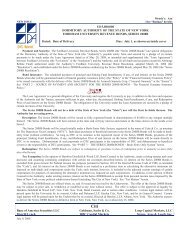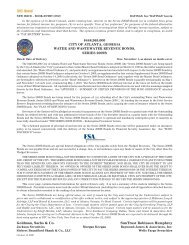Cleveland Clinic Health System Obligated Group - FMSbonds.com
Cleveland Clinic Health System Obligated Group - FMSbonds.com
Cleveland Clinic Health System Obligated Group - FMSbonds.com
Create successful ePaper yourself
Turn your PDF publications into a flip-book with our unique Google optimized e-Paper software.
licensure requirements, there can be no assurance that AHCA will not challenge past, current or future activitiesunder these laws and regulations, or that each <strong>Obligated</strong> Issuer will be able to cost effectively <strong>com</strong>ply with licensurerequirements that may be enacted or adopted in the future.Data Collection and PlanningThe State Center for <strong>Health</strong> Statistics was established in Florida to further data collection goals establishedby Florida law. AHCA requires certain types of health care facilities to submit data regarding case-mix, patientadmission or discharge data with patient and provider specific identifiers included, actual charge data by diagnosticgroups, financial data, accounting data, operating expenses, expenses incurred for rendering services to patients whocannot or do not pay, interest charges, depreciation expenses and demographic data. AHCA is charged with thedevelopment, endorsement, implementation and evaluation of practice parameters in order to reduce unwarrantedvariation in the delivery of medical treatment and improve the quality of medical care. To assist AHCA in itsmission, hospitals and medical staff are required to produce out<strong>com</strong>e data by diagnosis for each patient treated in ahospital and send the data to AHCA.The data collection and analysis activities of AHCA are financed by assessments on hospitals and otherhealth care facilities. Hospitals are assessed up to a maximum of .04% of their annual gross operating expenses topay for these data collection and analysis activities.Market DynamicsIn providing health care services, each <strong>Obligated</strong> Issuer <strong>com</strong>petes with a number of other providers in itsservice area, including for profit and not for profit providers of acute health care services. See “PART II. THEOBLIGATED GROUP — D. MARKET DYNAMICS” in APPENDIX A for a description of the principal<strong>com</strong>petitors of the <strong>Obligated</strong> <strong>Group</strong> in its northeast Ohio and Florida service areas and certain information regardingNortheast Ohio service area economics.In addition, other affiliations among health care providers in the <strong>Obligated</strong> Issuers’ service areas may beeither in a formative phase or under negotiation. Competition could also result from certain health care providersthat may be able to offer lower priced services to the population served by the <strong>Obligated</strong> Issuers. These servicescould be substituted for some of the revenue generating services currently offered by the <strong>Obligated</strong> Issuers. Theservices that could serve as substitutes for hospital treatment include skilled, specialized and residential nursingfacilities, home care, drug and alcohol abuse programs, ambulatory surgical centers, expanded preventive medicineand outpatient treatment, freestanding independent diagnostic testing facilities, and increasingly sophisticatedphysician group practices. Certain of such forms of health care delivery are designed to offer <strong>com</strong>parable services atlower prices, and the federal government and private third party payors may increase their efforts to encourage thedevelopment and use of such programs. The recent expiration of the moratorium on specialty hospitals could alsoresult in increased <strong>com</strong>petition for certain hospital services. In addition, future changes in state and federal law mayhave the effect of increasing <strong>com</strong>petition in the health care industry.The growth of e-<strong>com</strong>merce may result in a shift in the way that health care is delivered. Persons residing inthe <strong>Obligated</strong> Issuers’ service areas may be able to receive certain health services from remote providers. Forexample, physicians are increasingly able to provide certain services over the internet (e.g., teleradiology and secondopinions). Pharmaceuticals and other health services may also now be ordered on-line. Additionally, other serviceproviders in <strong>com</strong>petition with the <strong>Obligated</strong> Issuers may now <strong>com</strong>pete through this new medium by advertising theirservices and providing easy registration for <strong>com</strong>peting services over the internet. Also, alternative forms of healthcare payment including managed care organizations and consumer-driven care, as well as expanded preventivemedicine and outpatient treatment, could affect the <strong>Obligated</strong> Issuers’ ability to maintain their market share atcurrent levels.Recent “pay for performance” initiatives designed to reward hospitals, physicians, medical groups andother providers for achieving improvements in quality and clinical out<strong>com</strong>es will likely impact how health careservices are provided in the future. Quality benchmarks established by a number of industry organizations serve asthe basis for these reward programs. There are currently over 100 pay-for-performance programs operatednationwide by health plans, employer coalitions and public insurance programs. CMS is conducting several pay for40




